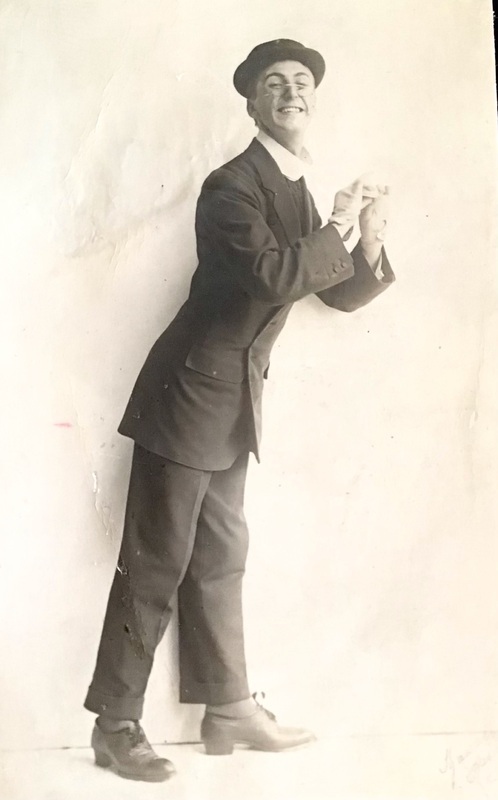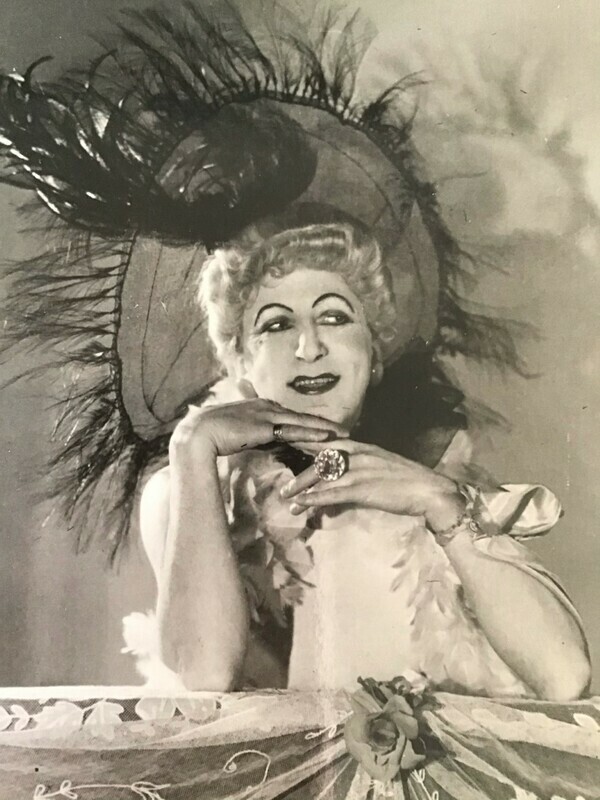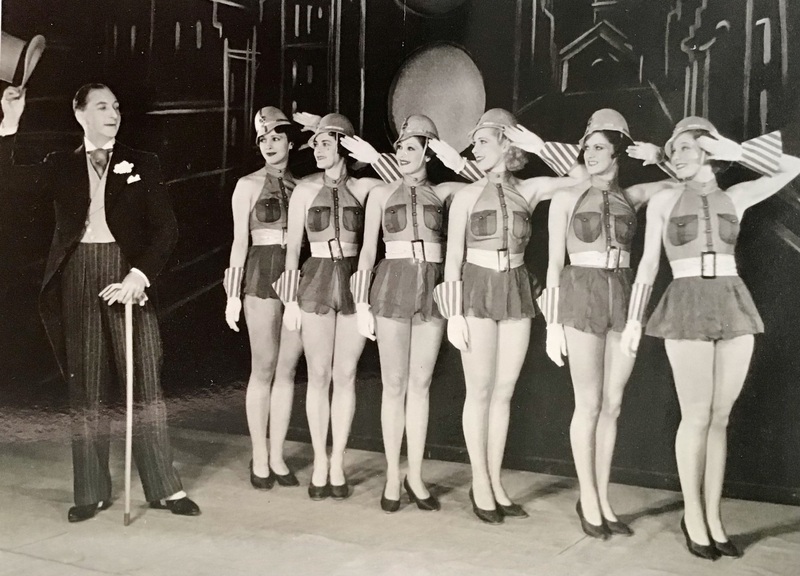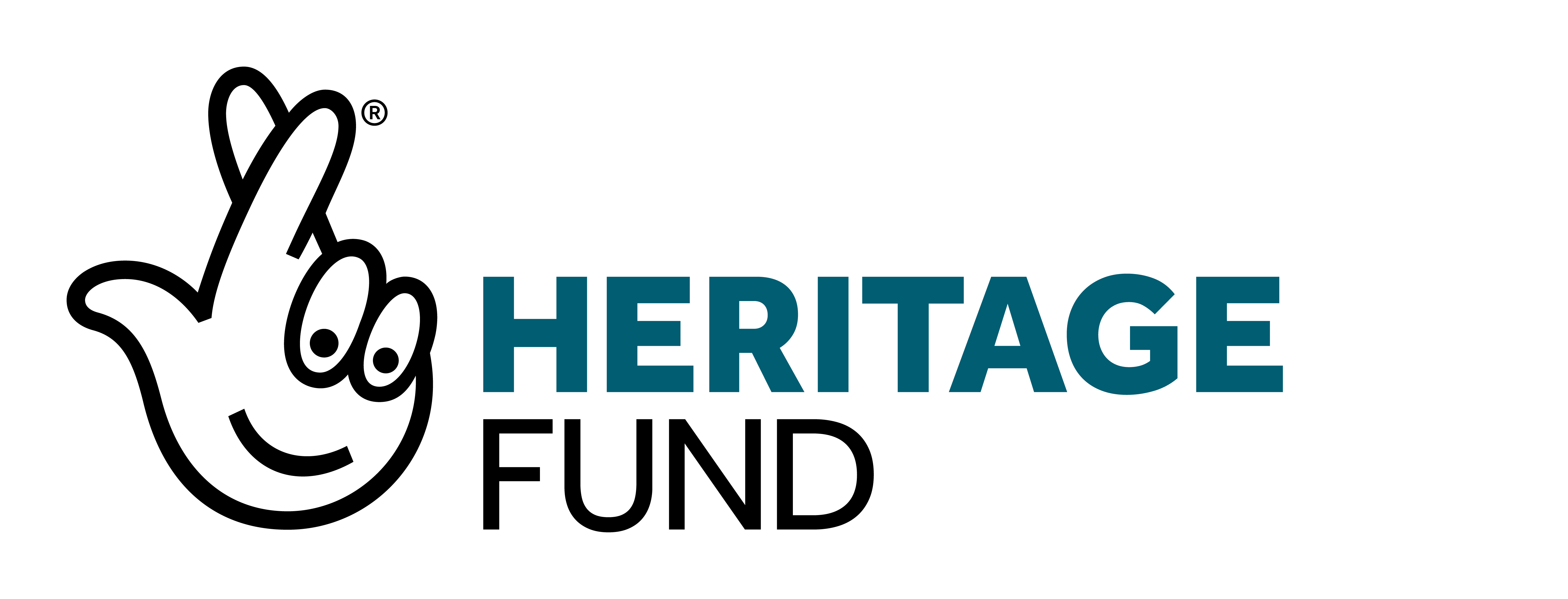The Life of Douglas (Dougie) Byng (1893 – 1987)
3rd July 2020
 Dougie ‘Bawdy but British’ Byng was the UK’s notorious king of double entendre. His performance career as a cross-dressing society entertainer spanned film, stage, variety and cabaret for more than 70 years. The content of his shows was so risqué, he was repeatedly banned by the BBC. His act could be seen at West End venues including Café de Paris, the Celebrite Club and eventually at his own nightclub, The Kinde Dragon (off St Martin’s Lane in London). His friend and colleague Noël Coward described Dougie’s act as ‘the most refined vulgarity in London’. Pushing the envelope that little bit further in true Dougie style, he actually called it ‘refined filth’. Either way, his female impersonation was side-splittingly crude and clever in equal measure.
Dougie ‘Bawdy but British’ Byng was the UK’s notorious king of double entendre. His performance career as a cross-dressing society entertainer spanned film, stage, variety and cabaret for more than 70 years. The content of his shows was so risqué, he was repeatedly banned by the BBC. His act could be seen at West End venues including Café de Paris, the Celebrite Club and eventually at his own nightclub, The Kinde Dragon (off St Martin’s Lane in London). His friend and colleague Noël Coward described Dougie’s act as ‘the most refined vulgarity in London’. Pushing the envelope that little bit further in true Dougie style, he actually called it ‘refined filth’. Either way, his female impersonation was side-splittingly crude and clever in equal measure.
Dougie lived for much of his later life in a flat in a Regency house on Arundel Terrace, Brighton. When he passed away his ashes were scattered in front of it, reflecting it was where he called home despite a vibrant international career and the decades he spent entertaining London’s social elite. The grand house was owned by the dashingly handsome British character actor Robert (Bobby) Flemyng (1912 – 1995) and was occupied from top to bottom by rental tenants, all of whom were gay, a familiar historical trope in queer communal living. In common with many gay men of his generation, Bobby was married and had a daughter to whom he was devoted.

In conversation with local gay historian James Gardiner about his friend Dougie Byng, Gardiner recalled these queer residential quarters in Kemptown to have been conveniently located within a short drive or bus-ride of the 'Unit One' men’s sauna in Rottingdean. The venue– complete with its own indoor swimming pool– was hugely popular at the time (1970s-1990s), with groups of men often driving down from London to frequent it (being, of course, long before the age of hook-up apps). Gardiner suggests that it was one of the very few saunas in the country where gay sex was– if not exactly sanctioned– discreetly allowed to happen without interference from the recently amalgamated Sussex Police. Elsewhere in the country, the state’s authorities were rigidly enforcing the terms of the 1967 partial legalisation of homosexual acts that decreed sexual encounters between men should only happen between consenting adults over the age of 21 in a private (domestic) setting with no more than two men present. Speculation was in abundance over what kind of relationship must have been enjoyed between the establishment’s owner and the local force that enabled it to operate unimpeded.
It was an odd set up. A discreet sign ‘Unit One Sauna. Men Only.’ between two shops on an unpromising, modern-ish seafront parade pointed patrons down an alley and down some stairs to the basement premises. They were presided over by a respectable looking and homely middle-aged lady named Dee and her visibly camp ‘son’, recalls Gardiner. In a nod to Charles Dicken’s tricoteuse ringleader from his 1859 Tale of Two Cities, patrons fondly called her Madame Defarge. Bobby Flemyng was a regular visitor.
 Whilst Dougie may never be the recipient of a crown for political correctness by 21C standards, he could nonetheless still teach today’s young British drag artists a lesson or two. Closer examination of his astute performance skills reveals an excellent ability to craft minimal costume into colloquial characterisation (he notably had an early career in fashion working for the designer Charles Alias, whose firm specialised in pantomime and fantasy costumes). And of course, he was a linguistic acrobat, the master of using the classic– yet frequently denigrated– comedic tool of double entendre to navigate otherwise unspeakable sexual taboos through irreverent, bawdy wordplay. Is it too much to suggest that Dougie’s refined vulgarity literally played a part in the movement towards gay liberation? In queer historian Matt Cook’s superb publication London and the Culture of Homosexuality, 1885-1914, the author reveals 1920s London to have had a thriving queer culture. This was the context within which Dougie began his career, and without a doubt, he would have been both a part of, and influenced by, this scene during the formative stages of his practice. The affection afforded to Dougie by those outside of the gay community was of broader benefit to softening attitudes towards those within it. His confident yet coded, wink-wink, nudge-nudge humour parodying the ins-and-outs of sex and gender displayed his control over the art of creating a ‘secret’ bond between performer and audience, regardless of class, gender or sexuality. Put simply, sharing a good old cheeky giggle is an effective way of inadvertently dissolving prejudices. Many a gay man has navigated his way through danger with a sharp tongue and sheer queer quick wittedness. Dougie’s drag was a profoundly revolutionary homosexual act, precisely because it was centre stage and reaching out to mainstream audiences en masse. It was more than a dirty joke– it was a dalliance in defiance.
Whilst Dougie may never be the recipient of a crown for political correctness by 21C standards, he could nonetheless still teach today’s young British drag artists a lesson or two. Closer examination of his astute performance skills reveals an excellent ability to craft minimal costume into colloquial characterisation (he notably had an early career in fashion working for the designer Charles Alias, whose firm specialised in pantomime and fantasy costumes). And of course, he was a linguistic acrobat, the master of using the classic– yet frequently denigrated– comedic tool of double entendre to navigate otherwise unspeakable sexual taboos through irreverent, bawdy wordplay. Is it too much to suggest that Dougie’s refined vulgarity literally played a part in the movement towards gay liberation? In queer historian Matt Cook’s superb publication London and the Culture of Homosexuality, 1885-1914, the author reveals 1920s London to have had a thriving queer culture. This was the context within which Dougie began his career, and without a doubt, he would have been both a part of, and influenced by, this scene during the formative stages of his practice. The affection afforded to Dougie by those outside of the gay community was of broader benefit to softening attitudes towards those within it. His confident yet coded, wink-wink, nudge-nudge humour parodying the ins-and-outs of sex and gender displayed his control over the art of creating a ‘secret’ bond between performer and audience, regardless of class, gender or sexuality. Put simply, sharing a good old cheeky giggle is an effective way of inadvertently dissolving prejudices. Many a gay man has navigated his way through danger with a sharp tongue and sheer queer quick wittedness. Dougie’s drag was a profoundly revolutionary homosexual act, precisely because it was centre stage and reaching out to mainstream audiences en masse. It was more than a dirty joke– it was a dalliance in defiance.
Much is known about Dougie, as his legend lives large in British theatrical history. His archive is held at the V&A though sadly, their specialist Theatre Department was made defunct in February 2021 and its intensely knowledgeable curators duly dismissed (a decision blamed on Covid, but that moreover reflects the broader, dire arts funding shortfalls).





